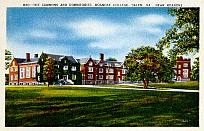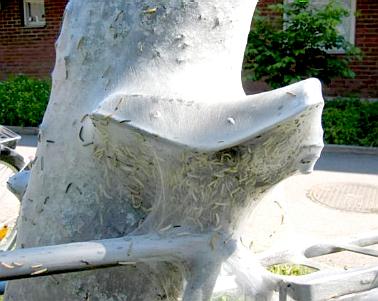Traveling Light --by the Baron
Since he has no alternate blog to neglect, as I do with The Neighborhood of God, the Baron asked if he might guest post here in the midst of chaos. I readily agreed...and then when I saw his essay, I realized it fits right in with chaos and the inexorability of entropy.
Enjoy his memoir...
With the day almost over, the rain has finally stopped and the sky is clearing. There’s a mist rising off the street, and I hear a steady drip-drip from the big maples next to the curb. It’s still August, but a few early yellow leaves have fallen and are lying in the gutter.
I’m walking up North Street, only it’s not North Street any more, it’s Brilyn Place. The house numbers are different, too, so the old address, the one our parents worked so hard to get us to memorize, is no longer of any use. But it’s still stuck in my head like a mantra: 711 North Street, Falls Church, Virginia. No zip; that was before zip codes.
Our house is on my right as I pass the intersection with Gordon Avenue, which still has its old familiar name. The trees are big now, but not as big as they should be — those maples, back when they were only a decade old, seemed so huge when we climbed them, when we sat in the lower branches and watched the helicopter seeds spiral down around us. Fifty years have added to the maples’ stature, but they and the houses still seem too small.
Up ahead Brilyn Place ends at the pebbly acoustic wall that shields the neighborhood from the interstate. When we lived here the big highway was just a gleam in the developer’s eye, but we all knew it was coming. It was going to knock down the houses at the end of the street, and lop the corner off Teddy’s parents’ lot. “It’ll take out Teddy’s trash burner,” said Steve.
There’s a dead end where the turn onto Hallwood Avenue used to be, and the sound of the heavy traffic on I-66 rumbles beyond the barrier. The old postwar brick houses along here are a little bit seedy now — the neighborhood never went upscale, as might have been expected had it been further from the interstate.
In the late summer of 1956 I was out on these streets and in the back yards all along here with the other boys of the neighborhood. There weren’t any boys my age, so I tagged along with my brother and his friends. Dave was three and a half years older than I, and he and the others tolerated me as long as I behaved myself.
There were five or six in the group — Dave, Teddy, Ricky, Robert, Steve, and maybe some others whose names are lost now. Steve was the oldest — a year older than Dave — and he was the leader, a ten-year-old with an assurance that seemed godlike to a child my age. When the boys formed a club, he outlined the rules. When teams had to be chosen, he performed the eeny-meeny-miny-moe. His hobbies became the gang’s hobbies. In later years, just before we moved, his parents sent him off to Fork Union to military school, and he came home for the holidays in a uniform. He was more than human.
Steve was the one who gave me my inexplicable nickname, “Dee”. When my brother used it, I didn’t like it, and I would call him “Day-Day” in return, for which he held equal hatred. But when Steve called me “Dee” I didn’t mind; it had a sort of affectionate tone to it. Or so it seemed.
I held Steve in awe, more so even than my own brother. Whatever interested him interested me. It was through Steve that I became fascinated with reptiles, and learned to catch snakes at a tender age. He taught me how to find box turtles by listening for their rustle as they crawled through the undergrowth, and how to track baby snapping turtles along the smelly edges of Four Mile Run.
Steve was an expert on military weaponry and the Civil War. He knew all about airplanes. He and Dave could identify all the makes and models of the cars that drove by, right down to the size of their engines and their horsepower.
And it was through Steve that Dave and I became interested in astronomy. We asked our parents for books on Mars and the Moon, and Dave got a three-inch reflecting telescope for Christmas so that we could watch the comet.
One night late in August 1956 the gang was lying in the front yard of our house, looking up at the sky. We were far enough from the streetlights so that some of the stars showed through, and Steve would point to the brighter ones and identify them.
It was just before Labor Day weekend, and the next week school would begin. I would be entering kindergarten, and my whole world was about to change. But for now it was just like it always had been, with the warm dark and the damp grass and the sound of the crickets in the bushes and the cicadas in the trees.
Steve had brought along a high-powered flashlight, and when he switched it on, gnats and moths were highlighted in the moving beam. He used it as a pointer, flicking it upwards as he identified Jupiter or Sirius. The boys took turns using the light, and eventually Steve passed it over to me.
I pointed it upwards, towards a faint star directly overhead.
“Dee, that star is probably fifty light-years away,” Steve told me. “You know what that means? It means that the beam of light will take fifty years to get there.”
I thought about it. “So, in fifty years, someone up there on a planet around that star will see my light shining on them?”
Steve chuckled. “Well, maybe. There won’t be much left of it by the time it gets there. But you never know — some alien up there might look up and see a little flicker of light.”
Not long after that we had to go in to bed. But I kept thinking about that beam of light, now moving up and away from the earth, traveling through space at an incredible speed. Fifty years! It might as well have been forever…
Time went by. I went off to kindergarten. Winter and summer came a couple of more times before we moved to Maryland. The federal government eventually built Interstate 66 through our old neighborhood, and then a lot of other things happened.
But I didn’t forget.* * * * * * * * * * * * * * *
I’ve turned around now, and the wall and the noisy interstate are behind me. I’m walking back down North Street — I mean Brilyn Place — and the lights are coming on in the houses on either side.
There’s our old house on the left, with a light in the front window. I resist the urge to walk up the sidewalk and knock on the door to ask if I can just take a quick peek inside.
And there’s the front yard, with the trees so big and overhanging now that no boys could see the sky through them. And with all the light pollution from Tysons Corner there may not be all that many stars visible, even if anyone could see through the trees.
The cold front is moving in, and a fresh breeze has lifted the mist off the street. Standing in the middle of North Street, I look straight up at the newly-cleared and darkened sky. Yes, there it is: a very faint star.
When I squint my eyes I can just picture a little cluster of young bug-eyed aliens gathered in front of their strange dwelling, looking upwards as a faint flicker of light shows in their own night sky. They’re turning a bright flashlight upwards in the same direction…
No need to stick around. I know when to come back.— August 30th, 2006
 Roanoke College (in nearby Salem) is nicely named, having the modesty to refuse to join the fad of grabbing the “University” appellation back when everyone else was doing it. Most universities in this country are really colleges and should have remained so. But then higher education is a big business now, so of course inflated terms are to be expected. If parents have to shell out twenty thousand dollars for junior’s education, it had better be at a “university”, no?
Roanoke College (in nearby Salem) is nicely named, having the modesty to refuse to join the fad of grabbing the “University” appellation back when everyone else was doing it. Most universities in this country are really colleges and should have remained so. But then higher education is a big business now, so of course inflated terms are to be expected. If parents have to shell out twenty thousand dollars for junior’s education, it had better be at a “university”, no?






